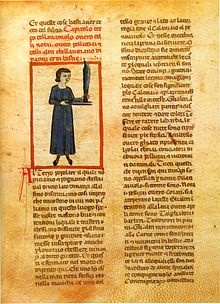Jacobus de Cessolis

Jacobus de Cessolis , also Jacob of Cessolis , was an Italian Dominican who lived in the 14th century . With his allegorical Liber de ludo scaccorum he wrote one of the first books on the game of chess .
Life
Jacobus probably came from Lombardy . The exact dates of his life are not known. From 1317 to 1322 he is mentioned in a document as a member of the Dominican Convention of Genoa in connection with the Inquisition in Genoa .
plant
Jacobus, presumably from Cessole , became known through the work Liber de moribus hominum et officiis nobilium ac popularium super ludo scacchorum , written in Latin before 1330 (for example "Book of the manners of people and the duties of the noble and inferior, derived from the game of chess") . It is preserved in over 100 manuscripts, making it one of the most widespread works of the late Middle Ages . The first printed edition appeared in Utrecht in 1473 . A little later, a translation into English ( Game and play of the chesse ), edited by William Caxton , followed . There were also several German arrangements, including a well-known rhyming version by Konrad von Ammenhausen . German prose translations and adaptations of the chess book by Jacobus de Cessolis are known as " Schachzabel books ".
The work is based on sermons given by Jacobus de Cessolis, in which he used the game of chess as an allegory of society. One of his literary models was De regimine principum by Aegidius Romanus .
“ Nam in solio positus fuit purpura indutus, quae est vestis regalis, in capite coronam, in manu dextra habens sceptrum, in sinistra habens pilam rotundam. Nam super alios obtinet et accipit dignitate, quod praetendit corona capitis. "
The chess pieces represent the individual levels of society . It is crucial that the "noble" pieces ( king, etc.) cannot achieve anything on their own and are dependent on the help of the "common" pieces ( pawns ). These are even named with job titles (blacksmith, businessman, doctor, etc.) to emphasize their role. So not only the people have obligations towards the nobility and clergy , but also vice versa. Therefore, the work has features of social criticism, which perhaps explains its great popularity.
expenditure
- De ludo scachorum Dutch. Johannes de Vollenhoe, Zwolle around 1478/1480 ( digitized version ).
- Ernst Köpke (ed.): Jacobus de Cessolis liber de moribus hominum et officiis nobilium. Brandenburg ad Havel 1879.
literature
- Oliver Plessow: Medieval chess zabel books between game symbolism and the mediation of values - the chess tract of Jacobus de Cessolis in the context of its late medieval reception , Rhema-Verlag, Münster 2007, ISBN 978-3-930454-61-7
- Gerard F. Schmidt: The Schachzabelbuch of Jacobus de Cessolis , Berlin 1961
- Heinz-Jürgen Kliewer : The medieval chess allegory and the German Schachzabel books in the succession of Jacobus de Cessolis . Heidelberg 1966
- Karl-Sigismund Kramer: farmers, craftsmen and citizens in the Schachzabelbuch. Deutscher Kunstverlag Munich, 1995, ISBN 3-422-06173-8
- Egbert Meissenburg: The Latin Schachzabelbuch des Jacobus von Cessolis, a bibliography , in: From the Antiquariat 1981, No. 8, pp. 337-340
- Rainer A. Müller : The doctor in chess with Jakob von Cessolis , Karl Thiemig, Munich 1981, 96 pages, ISBN 3-521-04135-2
Web links
- Literature by and about Jacobus de Cessolis in the catalog of the German National Library
- Publications on Jacobus de Cessolis in the Opac of the Regesta Imperii
Individual evidence
- ^ Anton Schwob : Schachzabel Books. In: Author's Lexicon . 2nd ed., Volume 8, Col. 589-592.
- ↑ Ernst Köpke (ed.): Jacobus de Cessolis liber de moribus hominum et officiis nobilium. Brandenburg an der Havel 1879, p. 1
| personal data | |
|---|---|
| SURNAME | Jacobus de Cessolis |
| BRIEF DESCRIPTION | Italian Dominican |
| DATE OF BIRTH | before 1317 |
| DATE OF DEATH | after 1322 |
